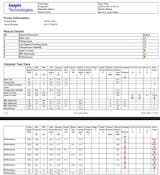Black smoke is also called soot. Diesel engine exhaust emits black smoke mainly due to excessively thick mixture, poor mixture formation, or incomplete combustion. The main factors are as follows:
(1) Insufficient compression force: after the valve, piston ring, and cylinder liner are worn out, the compression pressure is insufficient, the pressure and temperature at the end of compression cannot meet the requirements, the fuel combustion conditions become worse, and soot is easy to produce;
(2) Changes in the shape and volume of the combustion chamber: The shape of the combustion chamber has deteriorated due to manufacturing quality and long-term use. The change in the compression clearance will also change the shape and volume of the combustion chamber, which will affect the mixing quality of fuel and air and change the combustion conditions. Bad. The position of the piston is reversed, which affects the cooperation of the injector, combustion chamber, and intake port, and can not form a good mixture, resulting in incomplete combustion;
(3) Injector working poorly: Injector working poorly is mainly manifested in three aspects: first, poor spray quality; second, insufficient fuel injection pressure; third, fuel injector dripping. These three conditions will cause the fuel to not be fully mixed with the air in the cylinder, and thus cannot be completely burned. In addition, if the selected injector does not match the original machine, it will also cause engine exhaust;
(4) The fuel supply is too large: the fuel supply is too large, causing the mixture to be thick and incomplete;
(5) Improper fuel supply advance angle:
①The fuel supply advance angle is too large: In a direct injection diesel engine, when other parameters remain unchanged, appropriately increasing the fuel injection advance angle can reduce exhaust smoke. Because increasing the fuel injection advance angle will prolong the flame retardation period, increase the amount of fuel injected into the cylinder before ignition, increase the amount of premix, and increase the amount of premix, which speeds up the combustion speed, and the combustion can end earlier, thus causing rapid combustion. The formed carbon particles stay at high temperatures for more time, which is beneficial to the oxidation and disappearance of carbon particles.
However, premature fuel injection, due to the low pressure and temperature in the cylinder, is not conducive to the evaporation and mixing of fuel, so black smoke emissions are produced. At the same time, due to the greatly increased amount of premixed fuel, the diesel engine works rough, the combustion noise increases, and causes a greater mechanical load;
②The fuel supply advance angle is too small: the fuel is injected into the cylinder too late, and a part of the fuel is separated or discharged before it can form a combustible mixture. As a result, part of the fuel discharged with the exhaust gas in the exhaust pipe is decomposed and burned by high temperature, forming black The smoke is discharged along with the exhaust gas.
(6) Excessive intake and exhaust resistance: Excessive intake and exhaust resistance will result in insufficient intake of the engine and unclean exhaust, which will affect the inflation efficiency:
① The exhaust backpressure is too high or the exhaust pipe is blocked;
② The air filter or intake duct is blocked.
(7) Incorrect valve clearance adjustment: Excessive valve clearance will reduce the maximum valve opening and shorten the opening time, which will cause insufficient intake; if the valve clearance is too small, the valve will easily leak, thereby affecting the cylinder compression force. In both cases, the proportion of air in the mixture will be reduced, causing incomplete combustion;
(8) Engine valve phase change: The engine valve phase changes due to the quality of parts and assembly quality, resulting in changes in valve opening and closing time, which affects the combustion process of the engine. Severe valve phase changes will cause serious accidents where the valve and piston collide;
(9) The fuel injection pump works poorly:
①Serious wear of the plunger or delivery valve of the fuel injection pump. Serious wear of individual or all plungers or delivery valves of the fuel injection pump will cause the pressure of the fuel injection pump to drop, which will make the pressure build-up of the fuel injector (nozzle) relatively lag and delay the fuel injection. After combustion increases, so the diesel engine emits black smoke;
②The fuel supply of each sub-cylinder of the fuel injection pump is uneven and the fuel supply advance angle is inconsistent: the fuel supply is uneven, some cylinders supply large fuel, some cylinders have small fuel supply, and the cylinders with large fuel supply are incompletely burned. The exhaust smokes; the cylinder with a small oil supply is weak. When the fuel supply advance angle is inconsistent, some cylinders supply oil early and some cylinders supply oil late. Because the fuel supply advance angle is usually adjusted on the basis of one cylinder, the consistency of the fuel supply advance angle is generally not valued by people;
(10) Diesel is of poor quality, its performance indicators cannot meet the requirements, and its combustion is poor.




